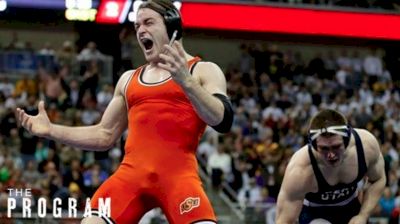10 Oklahoma State Wrestling Legends You Should Know
10 Oklahoma State Wrestling Legends You Should Know
Oklahoma State is under new leadership. Here are 10 names you need to know from wrestling’s most historic program.

No college wrestling program has a deeper tradition than Oklahoma State. The Cowboys won the inaugural 1928 NCAA Championships in Ames, Iowa, and never looked back.
The team’s Twitter handle says it all: 34 NCAA Championships, 143 individual National Champions. No one — in any sport — has more.
David Taylor was recently named the head coach of a program steeped in tradition. Here are 10 legendary Cowboys you should know.
Jack VanBebber
Born and raised in Perry, Oklahoma, VanBebber represents the rise of Cowboy Wrestling. He was a three-time undefeated NCAA champion (1929-31) and part of three team championships. He won the 1932 Los Angeles Olympics at 72 kg.
Stanley Henson
Henson wrestled for Art Griffith at Tulsa Central before Griffith took over for E.C. Gallagher at Oklahoma State. He was a three-time NCAA champion (1937-39) who suffered one college loss.
Dick Hutton
Hutton was a win away from becoming the first four-time NCAA champion. Freshmen weren’t allowed to compete until the 1969 season, but the NCAA granted a two-year window after World War II canceled the NCAA Championships from 1943-45.
The Tulsa, Oklahoma, native won titles in 1947 and 1948 before dropping a controversial split referees’ decision in 1949 to Minnesota’s Verne Gagne — a match they argued about until their finals breaths. Hutton won another title in 1950, making him a three-time NCAA champion and four-time finalist. He finished sixth at the 1948 Olympics after his sophomore year.
Yojiro Uetake
Uetake deserves to be in the conversation as the greatest college wrestler ever. He was an undefeated (58-0) three-time NCAA champion (1964-66) who won Olympic gold medals for Japan in 1964 and 1968.
Fred Fozzard
It all started with Rick Sanders and Fred Fozzard. The two Oregon natives became the United States’ first World champions in 1969. Fozzard won the 82 kg title after finishing 2-1-3 at the NCAA Championships for the Cowboys from 1966-68.
Dwayne and Darrell Keller
The Keller twins might be the most underrated college wrestlers of all time.
Dwayne won titles in 1968 and 1970 before finishing second in 1971. His son, Roderick, named after his college coach Myron Roderick, was born the morning of the '71 NCAA finals, so his mind was likely elsewhere when he lost 15-7 to Oregon State’s Roger Weigel. Keller's win over Portland State's Rick Sanders in 1968 is one of the biggest upsets in NCAA finals history.
Darrell wrestled in junior college before transferring to Oklahoma State, where he won titles in 1970 and 1971. He defeated Washington’s Larry Owings, 16-12, in the 1971 NCAA Championship finals after Owings upset Iowa State’s Dan Gable in 1970. Gable was 181-0 throughout his high school and college career before dropping his final match.
Kenny Monday
Monday was a three-time NCAA championship finalist for Oklahoma State, finishing second in 1982 and 1983 and first in 1984. He won gold medals at the 1988 Olympics and the 1989 World Championships and silver medals at the 1991 Worlds and 1992 Olympic Games before making a third Olympic team in 1996.
The Tulsa, Oklahoma, native is the first black Olympic wrestling champion.
Lee Roy, John, Pat, and Mark Smith
These collective numbers are absurd.
Lee Roy: three-time All-American (1977, 1979-80), 1980 NCAA champion, 1983 World silver medalist
John: three-time national finalist (1985, 1987-88), two-time NCAA champion (1987-88), four-time World champion (1987, 1989-91), and two-time Olympic gold medalist (1988, 1992)
Pat: first four-time NCAA champion (1990-92, 1994)
Mark: three-time All-American (1997-99)
Kendall Cross
Cross is Oklahoma State’s most recent Olympic champion. He secured 57 kg gold in 1996 after finishing 6-1-3 for the Cowboys from 1988-90. The Mustang, Oklahoma, native used flexibility and a stellar top game to become a fan favorite.
Jake Rosholt
Rosholt won NCAA titles in 2003, 2004, and 2006, with a third-place finish in 2005. He is Oklahoma State’s only three-time NCAA champion to compete on four national championship teams.